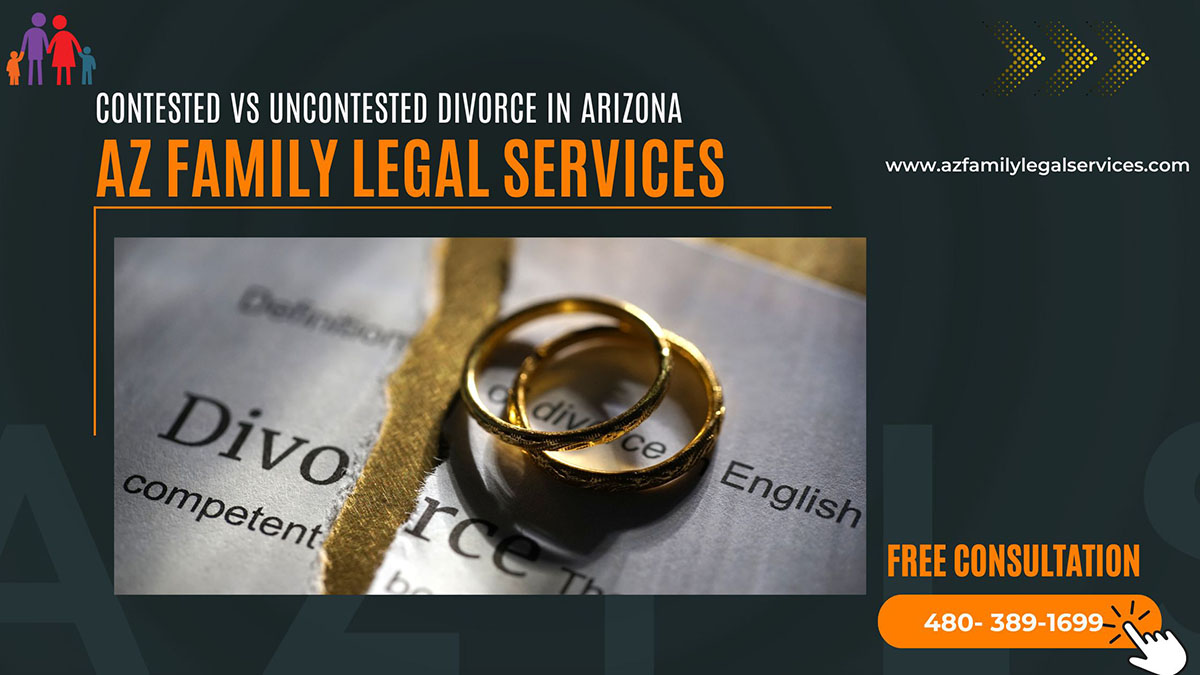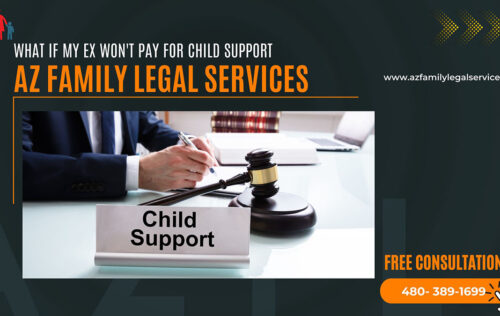Contested vs Uncontested divorce in Arizona

Divorce, a significant legal and emotional process, can unfold in different ways depending on the circumstances of the couple involved. In the state of Arizona, Divorcing Spouses navigate two primary paths: Contested and Uncontested divorce. These avenues present distinct approaches and implications, shaping the dissolution of marriage differently. Understanding the nuances between Contested and Uncontested divorce in Arizona is crucial for individuals embarking on this journey, as it can profoundly influence the duration, cost, and emotional toll of the process. This exploration delves into the key differences surrounding contested versus Uncontested Divorce within the legal framework of Arizona, shedding light on the paths available for couples navigating the complexities of marital separation.
If you require legal aid regarding family matters, such as resolving disputes or initiating Divorce proceedings, reach out to AZ Family Legal Services at (480) 389-1699, situated in Phoenix, Arizona. Our committed team can guide you through difficult circumstances, ensuring your rights and concerns are expertly handled. At AZ Family Legal Services, we aim to provide clarity on this matter and guide you through the Divorce Process with expertise and empathy.
Understanding Divorce Proceedings in Arizona
In Arizona, divorces can be categorized into two primary types: Contested and Uncontested. The distinction between these types significantly impacts whether a court appearance is required
Contested Divorce: Navigating Court Proceedings
In a Contested Divorce, the spouses are unable to reach an agreement on key issues such as Asset Division, Child Custody, or Spousal Support. This situation often leads to a more complex and adversarial legal process, which may require extensive court involvement.
Initial Filings and Response: The contested divorce process typically begins when one spouse files a petition for divorce with the court and serves it on the other spouse. Upon receiving the petition, the respondent spouse has a specified period to file a response, either agreeing or disagreeing with the allegations and requests outlined in the petition.
Discovery Phase: Following the initial filings, both parties engage in the discovery phase, during which they exchange relevant information and documents pertaining to the divorce case. This phase allows each spouse to gather evidence, assess the other party’s claims, and prepare their arguments for court.
Negotiation and Mediation: In many Contested Divorce cases, the court encourages or mandates alternative dispute resolution methods such as negotiation or Mediation. During these proceedings, both parties, along with their attorneys, meet with a neutral third-party mediator to facilitate communication, explore potential settlements, and resolve disputes outside of court.
Pre-Trial Proceedings: If Mediation efforts fail to produce a resolution, the case proceeds to pre-trial proceedings, where the court may hold hearings to address preliminary matters such as temporary orders for child custody, spousal support, or restraining orders.
Court Trial: If no settlement is reached through negotiation or mediation, the divorce case proceeds to trial, where each party presents their case before a judge. During the trial, both spouses may testify, present evidence, and call witnesses to support their arguments. The judge ultimately makes decisions on contested issues such as property division, child custody, and spousal support based on the evidence and applicable law.
Post-Trial Proceedings: Following the court trial, the judge issues a final Divorce decree outlining the terms of the divorce, including the division of assets, allocation of debts, Child Custody arrangements, and spousal support. If either party disagrees with the court’s decision, they may have the option to appeal the ruling, though the grounds for appeal are limited.
Uncontested Divorce: Streamlined Process
In contrast to Contested Divorces, Uncontested Divorces involve Spouses who agree on all relevant aspects of the Divorce, including Property Division, Child Custody, and financial matters. This streamlined process offers several advantages, including:
Simplified Paperwork: Since both spouses are in agreement, the paperwork required for an uncontested divorce is typically simpler and more straightforward. This reduces the time and cost associated with the divorce process.
Faster Resolution: Uncontested divorces can be finalized more quickly than contested divorces, as there is no need for extensive court involvement or litigation. Once the necessary paperwork is filed with the court and any waiting period has elapsed, the divorce can be granted without the need for a court appearance.
Reduced Conflict: By avoiding courtroom litigation, uncontested divorces often result in less conflict and animosity between spouses. This can be particularly beneficial for couples with children, as it allows them to maintain a more amicable co-parenting relationship post-divorce.
Lower Cost: Since uncontested divorces require less time and legal representation, they are generally more cost-effective than contested divorces. Spouses can save money on attorney fees and court costs, allowing them to allocate resources toward rebuilding their lives post-divorce.
Privacy and Confidentiality: Uncontested divorces offer greater privacy and confidentiality compared to contested divorces, as the details of the divorce settlement remain between the parties involved and do not become part of the public record through court proceedings.
Overall, uncontested divorces provide a more efficient, cost-effective, and amicable way for couples to dissolve their marriage when they can reach mutual agreements on all pertinent issues. However, it is essential for spouses to consult with a knowledgeable attorney to ensure that their rights and interests are protected throughout the process, even in cases of uncontested divorce.
Our Approach at AZ Family Legal Services
At AZ Family Legal Services, we understand that every Divorce Case is unique, and there is no one-size-fits-all solution. Our approach is tailored to meet the individual needs and circumstances of our clients, whether they are facing a contested or uncontested divorce.
For cases requiring court involvement, we provide diligent representation, thorough preparation, and strategic advocacy to protect our clients’ rights and interests. Our Experienced Attorneys are adept at navigating the complexities of Family Law and are committed to achieving favorable outcomes for our clients, both in and out of the courtroom.
Conclusion
In Arizona, the choice between Contested and Uncontested Divorce represents a pivotal decision in the journey of marital dissolution. While both paths lead to the end of a Marriage, they diverge significantly in terms of process, time, cost, and emotional strain. Contested divorces entail disputes over key issues such as Child Custody, Division of Assets, and Spousal Support, often requiring intervention from the court to reach resolution. On the other hand, uncontested divorces offer a smoother, more amicable route, where spouses mutually agree on major aspects of the divorce settlement.
Regardless of the chosen path, seeking guidance from legal professionals and understanding one’s rights and responsibilities under Arizona law are essential for navigating the complexities of divorce effectively. Ultimately, whether contested or uncontested, the goal remains the same: to move forward with clarity, dignity, and the opportunity for a fresh start.
Seeking Support from AZ Family Legal Services
At AZ Family Legal Services, we are dedicated to guiding our clients through the divorce process with compassion, expertise, and efficiency. Whether your case requires courtroom litigation or can be resolved through alternative methods, our team is here to provide unwavering support and advocacy every step of the way.
For expert legal assistance with your divorce case in Arizona, contact AZ Family Legal Services at (480) 389-1699 to schedule a consultation. Let us help you navigate this challenging time with confidence and peace of mind.
Frequently Asked Questions (FAQs)
What is the Difference Between a Contested and Uncontested Divorce?
In a contested divorce, spouses are unable to reach an agreement on key issues such as asset division, child custody, or spousal support, requiring court intervention. In contrast, an uncontested divorce occurs when both spouses are in agreement on all relevant aspects of the divorce, allowing for a more streamlined process without the need for court litigation.
How Long Does a Contested Divorce Take in Arizona?
The duration of a contested divorce in Arizona varies depending on factors such as the complexity of the issues involved, the caseload of the court, and the degree of cooperation between the parties. On average, contested divorces may take several months to resolve, with more contentious cases potentially lasting longer.
Are Contested Divorces More Expensive Than Uncontested Divorces?
Yes, contested divorces tend to be more expensive than uncontested divorces due to the additional legal fees, court costs, and potential for lengthy litigation. Uncontested divorces, on the other hand, are generally more cost-effective since they involve less time and resources.
Can I Change from a Contested to an Uncontested Divorce in Arizona?
Yes, it is possible to transition from a contested to an uncontested divorce in Arizona if both parties are able to reach agreements on all relevant issues through negotiation or mediation. This can streamline the process and reduce the time, cost, and stress associated with contested litigation.
What Are the Benefits of an Uncontested Divorce in Arizona?
The benefits of an uncontested divorce in Arizona include a faster resolution, lower cost, reduced conflict, greater privacy, and more control over the outcome. Spouses can avoid courtroom litigation and maintain a more amicable relationship post-divorce, especially when children are involved.
Do I Need a Lawyer for a Contested Divorce in Arizona?
While not required by law, it is highly advisable to seek legal representation for a contested divorce in Arizona, given the complexities and potential challenges involved. An experienced attorney can provide invaluable guidance, advocacy, and protection of your rights throughout the litigation process.
Can Child Custody be Decided in an Uncontested Divorce in Arizona?
Yes, child custody arrangements can be decided in an uncontested divorce in Arizona if both parents are in agreement on the custody arrangement. However, it is essential to ensure that the proposed custody agreement serves the best interests of the child and complies with Arizona’s child custody laws.
What Happens if We Cannot Agree on All Issues in an Uncontested Divorce?
If spouses are unable to reach agreement on all issues in an uncontested divorce, the case may transition into a contested divorce, requiring court intervention to resolve the disputed issues. Alternatively, parties may pursue alternative dispute resolution methods such as mediation to facilitate agreement.
Can Spousal Support be Awarded in an Uncontested Divorce in Arizona?
Yes, spousal support, also known as spousal maintenance, can be awarded in an uncontested divorce in Arizona if one spouse demonstrates a need for financial support and the other spouse has the ability to pay. The amount and duration of spousal support may vary depending on factors such as the length of the marriage and each spouse’s financial circumstances.
What Factors Determine Whether a Divorce is Contested or Uncontested in Arizona?
Several factors can influence whether a divorce in Arizona is contested or uncontested, including the degree of disagreement between spouses, the complexity of the issues involved, the willingness to negotiate and compromise, and the presence of legal representation. Ultimately, the nature of the divorce proceedings will depend on the unique circumstances of each case.



